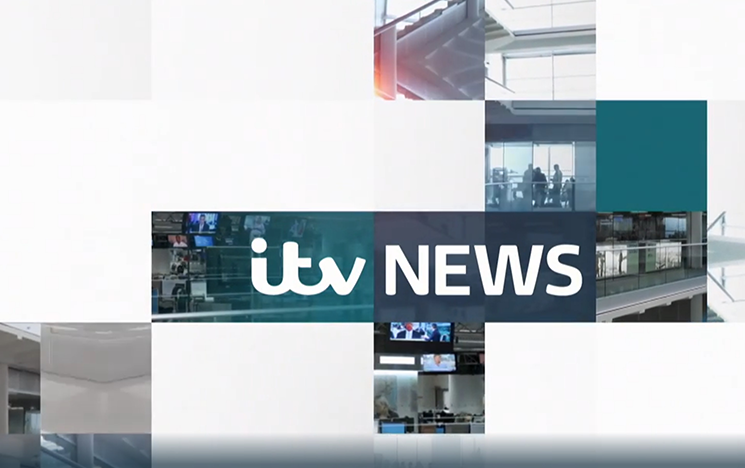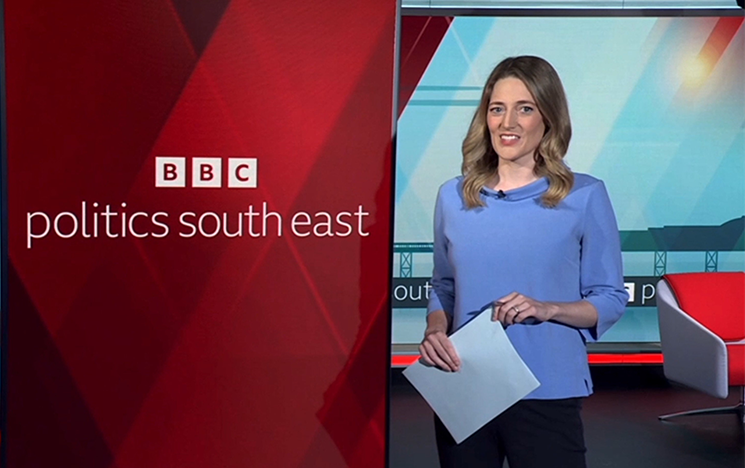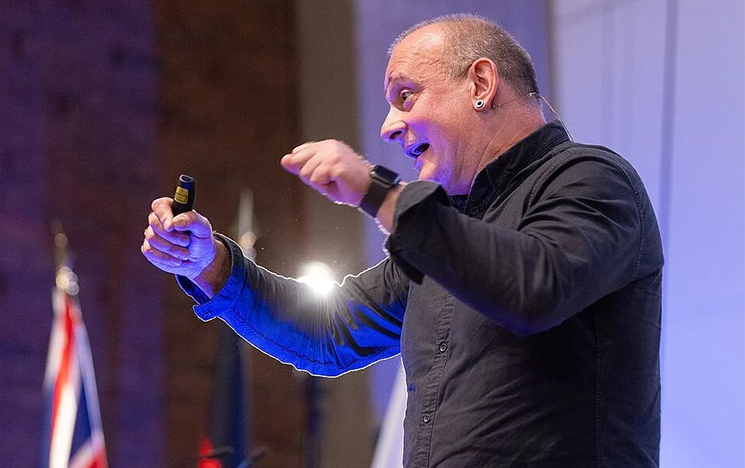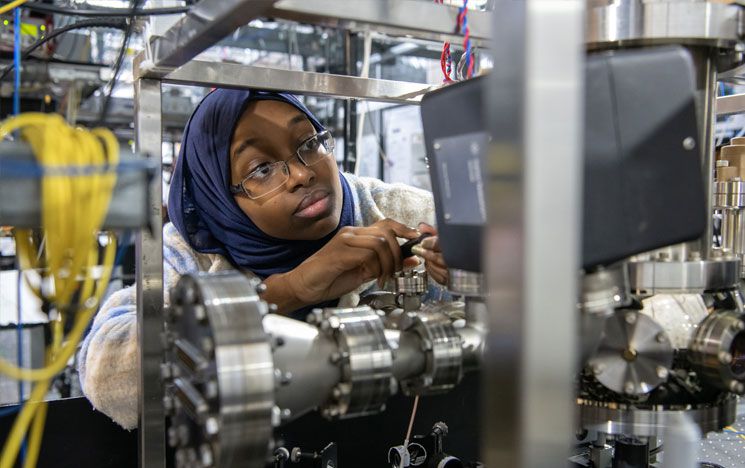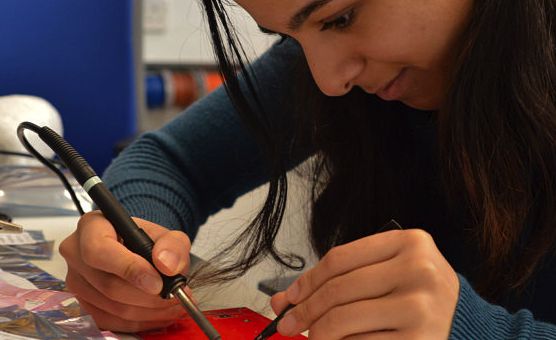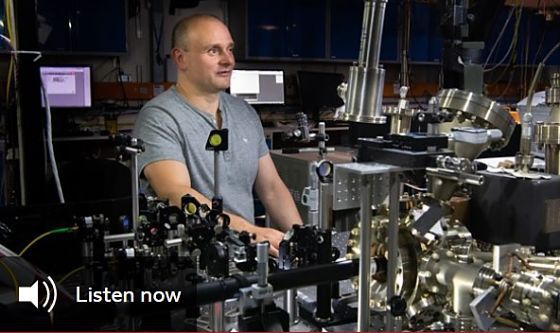Showcase
Find out about the recent work of our quantum experts.
A new Quantum Silicon Valley in Greater Brighton
Professor Winfried Hensinger explains quantum computing to ITV News and Secretary of State Peter Kyle.The segment also highlights quantum research at Universal Quantum, co-founded by Sussex academics.
Creating a Silicon Valley in Brighton
Professor Winfried Hensinger explains to BBC Politics South East his plans to take quantum developments beyond academia, and create a Quantum Silicon Valley in the region.
Professor Winfried Hensinger presents the annual ‘Queen’s Lecture’ in Berlin
The lecture, titled 'Constructing the world's most incredible machines: Quantum Computers', was 'gifted' to the City of Berlin by the late Queen Elizabeth II on her state visit in 1965.
BBC Breakfast: Making quantum computers modular
Our researchers have demonstrated for the first time that quantum bits can directly transfer between quantum computer microchips, with record-breaking speed and accuracy.
Is the future quantum?
Our researchers feature in a panel discussion hosted by Jim Al-Khalili as part of the University of Sussex Ask the Experts series.
Professor Winfried Hensinger interviewed by the BBC's The Inquiry
He explains why corporations are spending billions to turn quantum computers into workable technology.
2025 achievements
- The topic of teleportation, and whether it can ever be achieved, is discussed in BBC Radio 4's Curious Cases podcast. Prof. Winfried Hensinger explains to Hannah Fry and Dara Ó Briain how teleportation is already used to build quantum computers.
- Prof. Winfried Hensinger spoke to The Guardian to comment on Google's recent announcement of a breakthrough, as a quantum computer surpassed the ability of supercomputers. He suggests that whilst Google has demonstrated "quantum advantage", fully fault-tolerant quantum computers are still some way off.
- Dr Fedja Orucevic and his Quantum Systems and Devices group has secured a £250,000 grant for their work on quantum magnetometers – an emerging technology with the potential to transform navigation. These ultra-sensitive devices use tiny variations in the Earth’s magnetic field to pinpoint their location, meaning ships, land vehicles, and aircraft can still navigate even if satellite signals are jammed or unavailable.
- EVOLVE 25, an extraordinary day of tech innovation and community, took place at Brighton Dome on 4 July. Prof. Winfried Hensinger took to the Pioneer Stage to discuss constructing the world's most powerful computers, and growing a new 'Quantum' Silicon Valley in Greater Brighton. You can view his talk here.
- Prof. Matthias Keller has been awarded funding through the UK Research and Innovation Commercialising Quantum Technologies Challenge for his role in HyperIon - a groundbreaking project led by NU Quantum in partnership with Cisco Systems. The project will develop a scalable interface between quantum bits (qubits) and light-based networks, a crucial step toward building distributed quantum computers.
- To coincide with World Quantum Day on 14 April, Prof. Winfried Hensinger explained to BBC Sussex why Brighton is set to become the Silicon Valley of the UK, with the Sussex Centre for Quantum Technologies at the heart of quantum computing innovation and progress (go to 1:03:06, 1:07:22).
- Also on World Quantum Day, Prof. Barry Garraway gave a public talk in Stellenbosch, South Africa, on 'Quantum Technology: What it is, origins and future'. He was interviewed by the local university radio station in Stellenbosch on the same day.
- We're delighted that Prof. Matthias Keller's Ion Trap Cavity-QED and Molecular Physics group have been awarded by Innovate UK's Quantum Missions pilot competition. Over £12m has been invested across 10 projects to support the commercialisation and adoption of quantum computing (QC) and quantum networks (QN) projects.
-
In March, we were thrilled to welcome to campus the Future Digital Economy Minister, Baroness Jones, who praised the groundbreaking quantum technology research taking place at the University of Sussex. During her visit, the Department for Science, Innovation and Technology (DSIT) Minister met with Prof. Winfried Hensinger, to learn about the University's pioneering work in quantum computing and its role in driving forward the UK’s technological and economic future. The visit was reported on by The Quantum Insider.
- February 20 saw Prof. Winfried Hensinger contribute to a panel discussing What is the future of Quantum? The event was part of a flagship two day conference held by the Royal Society to celebrate the International Year of Quantum, bringing together industry experts to discuss the future of quantum computing (go to 5:41:04).
-
A theory proposed by Prof. Jacob Dunningham and PhD student Sean Moore has been successfully demonstrated by a team in China, using quantum physics to enhance the detection of remote objects in a way that is completely secure against eavesdropping or spoofing. This proof-of-principle experiment represents a big advance in the development of range-secure sensing applications that include environmental and health monitoring, surveillance, and disaster response. Read more in IEEE Spectrum.
- A group led by Prof. Matthias Keller have collaborated with CPI Electron Device Business through an exciting Knowledge Transfer Partnership. They aim to deliver a commercial off-the-shelf optical clock based on the Calcium Ion Frequency Standard (CIFS), marking a significant leap forward in precision timekeeping and stability.
2024 at a glance
- Following Google's unveiling of it's Willow chip, Prof. Winfried Hensinger explained to the Guardian Science podcast the implications it has to our progress towards creating quantum computers, with real world applications.
- In November, Prof. Winfried Hensinger discussed how quantum physics can power practical computers to tackle industry challenges which will revolutionize our work and lives. The talk was part of the New Scientist Instant Expert programme of events, examining the weird and wonderful world of quantum mechanics.
-
The inaugural MPIE conference took place on University of Sussex campus on 6 September, uniting researchers from the fields of mathematics, physics, informatics and engineering. It was great to see collaboration and networking across the disciplines, encompassing the themes of Data science, Computing approaches, Materials, and Modelling life.
-
Leading researchers from around the world came to Brighton in July for the ICAP 28 Satellite workshop on trapped ion quantum computing, quantum error correction and applications, discussing how to build and program practical quantum computers.
-
Dr Fedja Orucevic’s Quantum Systems and Devices group is working with CDO2 to develop a proof-of-concept QCDA (Quantum Current Density Analyser) system, that could potentially be used for real-time non-invasive monitoring of cell ageing processes during manufacture, resolving features and defects to improve yield and speed.
- Our Centre Director Prof. Winfried Hensinger discusses quantum computers on the Instant Genius podcast. He explains why they are described as 'the holy grail' of science, and how the Ion Quantum Technology group are at the forefront of developing a quantum computer.
-
The Universities of Sussex and Bristol have launched a £24m doctoral training centre to develop future leaders in quantum tech. The centre will be delivered by a leading team of academics from both universities, along with industrial partners and will provide an innovative four-year, fully-funded programme of training and research in quantum technologies for postgraduate students from September 2024.
- Our Quantum Systems and Devices group is leading pioneering experiments on the London Underground. The group, led by Dr Fedja Orucevic, is conducting trials of quantum inertial navigation systems to accurately determine train position, see article Quantum train location testing on the London Underground.
2023 at a glance
- Dr Fedja Orucevic and the Quantum Systems and Devices group hosted the INSTA QT annual international workshop on 12 December, on the theme 'Battery monitoring for carbon reduction'. The International Network for Sensors and Timing Applications in Quantum Technologies works with research partners across 12 countries to establish Global Virtual Workshops to tackle specific global challenges: poverty, zero hunger; good health and wellbeing; climate action; clean water and sanitation and sustainable cities and communities.
- How does a quantum computer work, and how will they change the world? Prof. Winfried Hensinger explains to IFL Science how the background lies in quantum mechanics, and why the world will benefit from this new approach to computation. Prof. Hensinger also features on BBC Radio 4 All Consuming: Microchips, explaining his group's recent quantum computing breakthrough (go to 15:40).
- On 14 July, we were proud to host the annual QSNET workshop. Bringing together 30 colleagues from Sussex, Imperial, NPL, Birmingham and beyond, for a day of talks, poster presentations and networking.
- The University of Sussex's "Summer of Research" provided Dr Sam Hile with an opportunity to showcase the research of the Ion Quantum Technology group. His talk 'Fixing Quantum Mistakes: errors in quantum computers, and how to deal with them' explores why quantum computers are so difficult to build.
- Our Quantum Systems and Devices group were well represented at this year's Young Atom Opticians conference, hosted by ICFO in Barcelona. Poppy Joshi, Tasha Beirrum and Leigh Thomas Page presented respectively: 'Developing a Bose-Einstein condensate microscope'; ‘Radio-frequency dressing of Bose-Einstein condensates for investigating quantum phase’; and 'A new system to automatically characterise alkali vapour-cells'.
-
The Ion Quantum Technology group welcomed the BBC’s Technology Editor, Zoe Kleinman, into their labs. The visit and an interview with Prof. Winfried Hensinger feature in a programme from BBC Tech World Service, where he reveals how his childhood ambitions have shaped his research (go to 14:27).
- In March we participated in the British Ion Trap Conference BrIT-C 2023 in Teddington. Ryan Willetts of our Geonium Chip group won the runner up prize for best oral presentation with his talk The Geonium Chip Penning Trap: a novel ion trap quantum technology.
- We start the year with a paper from the Ion Quantum Technology group published by Nature Communications, led by Dr Mariam Akhtar: A High-Fidelity Quantum Matter-Link Between Ion-Trap Microchip Modules. The researchers demonstrate for the first time that quantum bits can directly transfer between quantum computer microchips with record-breaking speed and accuracy. The paper has been selected to represent one of the best recently published examples of quantum research in Nature Communications Editor's highlights.
2022 at a glance
- Prof. Matthias Keller of our Ion Trap Cavity-QED and Molecular Physics group has an article published in Contemporary Physics titled Cavity-QED with Single Trapped Ions.
- Physicists from University of Sussex spin-out company, Universal Quantum, have secured a record-breaking investment from the German government to build a truly scalable trapped ion quantum computer within the next four years. Read more about Prof. Winfried Hensinger and Dr Sebastian Weidt's achievement, here.
- The University of Sussex Research with Impact seminar series ran a webinar focusing on quantum technology research at the University. Several of our staff and PhD students were invited to explain how research undertaken at the Centre is impacting wider technological advances. Watch the recording here.
- In October, Prof. Winfried Hensinger offered an inspiring speech to launch the Mid Sussex STEM challenge, as reported here in Sussex World. The next generation of engineers will research and create a remote-controlled vehicle that can navigate an obstacle course at the South of England showground.
- Dr Jose Galiana Verdu of our Geonium Chip group has been awarded a share of UKRI funding worth £6m. The grant of £500,000 for 2-3 years will be funded by STFC via the call Developing Quantum Technologies for Fundamental Physics. Read about his goal to develop a quantum microwave sensor capable of measuring the absolute mass of the neutrino particle in The Quantum Insider.
-
A paper published in Nature by Prof. Alessia Pasquazi and her team includes research carried out by EPic Lab at Sussex: Self-Emergence of Robust Solitons in a Micro-Cavity details how the group have overcome a major obstacle in producing a portable atomic clock. Read more about this story here.
- Members of our EPic Lab attended the Advanced Photonics Congress in Maastricht in July to present a range of their research: 'Frequency control of Laser Cavity Solitons for metrological applications' (Antonio Cutrona), 'Terahertz 3D micro-tomography via time-resolved nonlinear ghost imaging' (Dr Luana Olivieri), 'Deterministic Terahertz wave control in complex media' (Vivek Kumar), and 'Spatiotemporal superfocusing of ultrafast Terahertz waves in complex media' (Vittorio Cecconi).
- The Ion Quantum Technology group present some of the quantum control methods used for dealing with noise for trapped ions with a focus on static magnetic field gradients and microwaves approaches. Read more in their paper Quantum Control Methods for Robust Entanglement of Trapped Ions.
- Prof. Winfried Hensinger, featured on BBC 5 Live Breakfast show explaining why the UK is leading in the development of quantum computing, with applications ranging from the pharmaceutical and financial sectors, to fertiliser production (go to 2:50).
- Physicists in the Quantum Systems and Devices group led by Dr Mark Bason have used magnetic imaging for assessing electric vehicle batteries, detailed in this published peer reviewed paper in the Journal of Power Sources. With this new technology, the researchers can visualise the inside workings of an electric vehicle battery.
- Colleagues from the EPic Lab had the opportunity to attend the SPIE Photonics Europe Innovation Village 2022 3 - 7 April, and present their project on developing a Virtual Optical Effect (VOE) application.
- Our Sussex Quantum physicists were delighted to welcome Mims Davies, Employment Minister, to campus in April. She learned about the pioneering research taking place in our labs, as well as the potential to create a new "quantum Silicon Valley" in her Mid Sussex constituency.
- Foni Lebrun-Gallagher and colleagues in the Ion Quantum Technology group publish their paper A Scalable Helium Gas Cooling System for Trapped-Ion Applications in IoP Science.
- Imagine being able to remotely monitor environmental factors in labs which can in turn be used to control systems in inaccessible and unpredicable envrionments such as space. The Quantum Systems and Devices group have achieved this, you can read more about it here and their published paper in IoP Science.
- Prof. Matthias Keller's ITCM group are collaborating with other national quantum centres on a project supported by UKRI Strategic Priorities Fund. The aim of QSNET is to create a network of innovative quantum sensors, including atomic and molecular clocks and optical cavities.
- Mark Webber, of the Ion Quantum Technology group and Universal Quantum, has led on a paper published in AVS Quantum Science. It describes how a quantum computer could break the encryption of Bitcoin. The paper can be read here The Impact of Hardware Specifications on Reaching Quantum Advantage in the Fault Tolerant Regime, and a press release here Sussex Scientists Reveal how Quantum Computing can Break Bitcoin and Help Tackle World Hunger.
- Prof. Peter Kruger explains how his Quantum Systems and Devices group are using quantum physics to see inside electrical vehicle batteries, in this Future Net Zero podcast on 12 January (go to 3:15).
